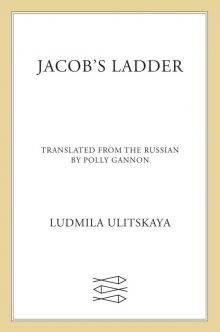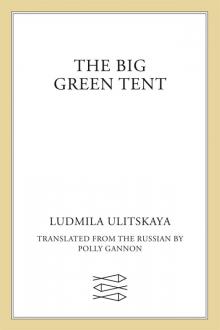- Home
- Ludmila Ulitskaya
The Big Green Tent
The Big Green Tent Read online
Begin Reading
Table of Contents
About the Author
Copyright Page
Thank you for buying this
Farrar, Straus and Giroux ebook.
To receive special offers, bonus content,
and info on new releases and other great reads,
sign up for our newsletters.
Or visit us online at
us.macmillan.com/newslettersignup
For email updates on the author, click here.
The author and publisher have provided this e-book to you for your personal use only. You may not make this e-book publicly available in any way. Copyright infringement is against the law. If you believe the copy of this e-book you are reading infringes on the author’s copyright, please notify the publisher at: us.macmillanusa.com/piracy.
Do not be consoled by the injustice of our time. Its immorality does not prove our own moral worth; its inhumanity is not sufficient to render us human merely by opposing it.
—Boris Pasternak to Varlam Shalamov, July 9, 1952
PROLOGUE
Tamara sat before a runny omelet on a plate, the vestiges of sleep still clinging to her.
Trying not to yank at the living pelt, Raisa Ilinichna, her mother, nudged a wide-tooth comb through Tamara’s hair as gently as she could.
The radio disgorged strains of triumphal music, but it wasn’t terribly loud: Grandmother was asleep behind the partition wall. Then the music died out. The pause that followed was too long, and seemed to portend something. The familiar, solemn radio voice resounded: “Attention! This is Moscow speaking. Transmitting an official announcement to all radio stations of the Soviet Union.”
The comb froze in Tamara’s hair. She snapped out of her half-sleep, swallowed down the last of the omelet, and in a hoarse, morning voice said, “It’s probably just some dumb cold, and they have to go broadcasting it to the entire—”
She didn’t get to finish her thought. Raisa Ilinichna jerked Tamara’s head back with a violent tug of the comb, so that her jaw snapped shut.
“Shush!” Raisa Ilinichna’s voice was tight.
Grandmother, wearing a robe as ancient as the Great Wall of China, appeared in the doorway. She listened to the announcement, and at the end, her face and eyes shining, said, “Raisa, dear, run down to the store and get us something sweet. Today is, after all, Purim. Besides, the Big Samekh seems to have kicked the bucket.”
Tamara didn’t yet know what Purim was, or why it required something sweet; nor did she know who this Big Samekh was who had most likely kicked the bucket. She was still too young to know that in her family they had always referred to Stalin and Lenin in code, calling them conspiratorially by the first letters of their names, in an ancient secret language—Hebrew. The letters were samekh and lamed.
Meanwhile, the beloved official voice of the nation, familiar to every household in the land, was announcing an illness far worse than a cold.
* * *
Galya had already thrown on her school dress and was now looking for the pinafore. Where could it be? She fished around under the trestle bed—maybe it had fallen behind it.
Suddenly her mother burst in, with a kitchen knife in one hand and a potato in the other. She wailed in a voice so strange that Galya thought she might have cut her hand open. But there was no blood.
Her father, grouchy in the mornings, pulled his head from the pillow. “What are you yelling about, Ninka? Isn’t it too early for that?”
But her mother wailed even louder, a jumble of incoherent words streaming out.
“He’s dead! Wake up, you idiot! Get out of bed! Stalin’s dead!”
“Did they make an announcement, or what?” Her father raised his big head; a lock of hair stuck to his forehead.
“They say he’s ill. But he’s dead, I swear to God! I feel it in my bones.”
Then the incoherent wailing resumed, punctuated by a plaintive, melodramatic lament: “Lord in heaven! What will become of us?”
Wincing, her father barked, “Quit moaning, woman! How much worse can things get?”
Just then Galya’s fingers grasped the pinafore, which had indeed fallen behind the bed.
So what if it’s wrinkled. I’m not ironing it, she decided.
* * *
By morning her fever had subsided, and Olga fell into a sound sleep, undisturbed by sweating or coughing. She slept all the way through till dinnertime, when her mother came in and announced, in a stern, resonant voice, “Olga, get up! Misfortune has befallen us.”
Without opening her eyes, clutching the pillow in the hope that it was all a dream, but already feeling terror pulsing in her throat, Olga thought, War! The Fascists are attacking! War has started!
“Olga, get up!”
What a catastrophe! The Fascist hordes are trampling our holy Motherland, and everyone will get to go to the front to fight, but me …
“Stalin’s dead!”
Her heart was caught in her throat, but she still didn’t open her eyes: thank goodness it wasn’t war after all. When the war started, she would be bigger and they would take her, too. And she buried her head under the blanket, muttering, “And then they’ll take me, too,” and fell asleep to this comforting thought.
Her mother let her sleep.
THOSE WONDROUS SCHOOL YEARS
It’s fascinating to trace the trajectories of people destined to meet. Sometimes such encounters happen without any special help from fate, without elaborate convolutions of plot, following the natural course of events—say, people live in adjacent buildings, or go to the same school.
The three boys all went to the same school. Ilya and Sanya had known each other since the first grade. Mikha joined them later. In the hierarchy that takes shape willy-nilly in every herd, all three of them occupied the lowest rung—due to their complete disinclination to fight or be cruel. Ilya was long and lanky, his hands and feet stuck out from his short sleeves and trouser legs. Moreover, there wasn’t a single nail or sharp piece of metal he hadn’t snagged his clothes on. His mother, the doleful, single Maria Fedorovna, wore herself out attaching unsightly patches to his clothes with her graceless fingers. Sewing was not her forte. Ilya was always dressed more poorly than the other students, who were themselves poorly dressed. He liked to cut up and play the clown, making a spectacle of his poverty and thereby overcoming it.
Sanya had it even worse. His classmates were filled with envy and disgust at his zippered jacket, his girlish eyelashes, the irksome sweetness of his face, and the cloth napkin his homemade lunch came wrapped in every day. Added to that, he took piano lessons. Many of the kids had seen him walking down Chernyshevsky Street, the former and future Pokrovka, to the Igumnov Music School, one of his hands clutching his grandmother’s hand, the other clutching a folder with sheet music. Sometimes they saw him even on days when he was sick with one of his frequent minor, but protracted, illnesses. His grandmother was all profile. She would place one slender leg in front of the other like a circus horse, her head swaying rhythmically in time. Sanya walked by her side, but slightly behind, as befits a groom.
Contrary to his regular school, at music school everyone sang the praises of Sanya. In his second year there, he played Grieg at his recital with a skill that few fifth-year students could muster. The small stature of the performer was also touching. At eight years old he was mistaken for a preschooler, and at twelve he looked like he was eight. For this reason, they dubbed him Gnome at his regular school. And the nickname was not an affectionate one; they made fun of him mercilessly. Sanya consciously avoided Ilya, not so much because of his teasing—which was not directed at Sanya, but which sometimes grazed him nonetheless—but because of their humiliating difference in s
ize.
Mikha was the one who brought Sanya and Ilya together when he appeared in their midst in the fifth grade. His arrival was greeted with delight. A classic redhead, he was the ideal target for gibes.
His head was shaved bare, except for a crooked, reddish-gold tuft in front. He had translucent magenta-colored ears that stuck out from the sides of his head like sails; but they were in the wrong place, too close to his cheeks, somehow. He had milky white skin and freckles, and his eyes even had an orangey hue. As if all that weren’t enough, he was bespectacled, and a Jew, to boot.
The first time Mikha got beaten up was on the first day of school. The beating, which took place in the bathroom during recess, was a mild one—just a formality, to give him something to think about. It wasn’t even Murygin and Mutyukin who did it—they had better things to do—but their sidekicks and underlings. Mikha stoically took what was coming to him, then opened his book bag to take out a handkerchief and wipe away his snot. At that moment, a kitten squirmed out of the bag. The other boys grabbed the kitten and started tossing it back and forth. Just then, Ilya, the tallest boy in the class, walked in. He managed to intercept the kitten in midair, over the heads of the makeshift volleyball team, when the bell sounded, putting an end to the game.
When they returned to the classroom, Ilya thrust the kitten at Sanya, who had materialized right beside him, and who then stuffed the kitten into his book bag.
During the final break, those archenemies of the human race, Murygin and Mutyukin, whose names will serve as the basis for a future philological conceit and so deserve mention, looked around for the kitten, but soon forgot about it. That day, school was dismissed after only four classes, and the boys tore out of the school building, whooping and hollering. These three were left to their own devices in the empty classroom bedecked with brightly colored asters—first-day-of-school offerings for the teacher. Sanya extracted the half-smothered kitten from the satchel and handed it to Ilya. Ilya gave it to Mikha. Sanya smiled at Ilya, Ilya at Mikha, Mikha at Sanya.
“I wrote a poem. About him,” Mikha said shyly. “Here it is.”
He was the handsomest of cats,
And just about to meet his death,
When Ilya jumped into the fray.
And now the kitten’s here today.
“Not bad. Though it’s no Pushkin,” Ilya said.
“‘Now the kitten’s here today’ is too pompous,” said Sanya. Mikha agreed humbly.
“How about ‘And now the kitten’s here to stay.’ That sounds better.”
Mikha then told them in great detail how in the morning, on his way to school, he had snatched the unfortunate creature out of the jaws of a canine predator. He couldn’t take the kitten home, however, because he didn’t know how his aunt would react. He had been living with her only since the previous Monday.
Sanya stroked the kitten’s back and sighed. “I can’t take him home with me. We’ve already got a cat. He wouldn’t like it.”
“Fine, I’ll take him.” Ilya casually scooped up the kitten.
“They won’t mind, at home?” Sanya said.
Ilya grinned. “I’m in charge at home. My mom and I get along great. She listens to me.”
He’s so grown up, I’ll never be like him. I could never say “My mom and I get along great.” It’s true—I’m just a mama’s boy. Though Mama does listen to me. And Grandmother listens, too. Oh, does she ever! But in a different way, Sanya mused.
Sanya looked at Ilya’s bony hands, covered all over in bluish-yellow bruises and scars. His fingers were so long they could reach two octaves. Mikha was trying to balance the kitten on his head, above the reddish gold tuft left there yesterday “for growing back” by the magnanimous barber at the Pokrovsky Gates. The kitten kept slithering off, and Mikha kept planting him on his head again.
Together, the three of them left the school building. They fed the kitten melted ice cream. Sanya had some money, just enough for four portions. As it turned out later, Sanya almost always had money. This was the first time Sanya had ever bought ice cream on the street and eaten it straight from the wrapper. When Grandmother bought ice cream, they took it home with them, placed the sagging mound in a special glass dish, and topped it with a dollop of cherry jam. That was the only way they ever ate it.
Ilya told them excitedly about the camera he was going to buy with the first money he earned. He also laid out his precise plan for making that money.
Out of the blue, Sanya blurted out his own secret—he had small, “unpianistic” hands, and that was a handicap for a performer like him.
Mikha, who had moved in with his third set of relatives in seven years, told these boys, nearly complete strangers, that he was running out of relatives, and that if his aunt refused to keep him he’d have to go back to the orphanage.
The new aunt, Genya, had a weak constitution and suffered from some undefined illness. “I’m sick from head to toe,” she would say with mournful significance. She complained constantly of pains in her legs, in her back, her chest, and her kidneys. She also had a daughter who was disabled, which put a further strain on her health. Any kind of work was beyond her strength, so her relatives finally decided that her orphaned nephew should move in with her, and that they would all contribute money for his upkeep. Mikha was, after all, the son of their brother, who had perished in the war.
* * *
The boys wandered aimlessly, chattering nonstop, until they found themselves on the banks of the Yauza, where they fell silent. They were struck with the same feeling in unison—about how fine it all was: trust, friendship, togetherness. There was no thought of who might be the leader. Rather, they took a mutual interest in one another. They still knew nothing of Sasha and Nick* or of the oath they took on the Sparrow Hills. Even the precocious Sanya hadn’t discovered Herzen yet. And the run-down districts the boys had been wending their way through—Khitrovka, Gonchary, Kotelniki—had long been considered the dregs of the city, no setting for romantic oaths. But something important had transpired, and this sudden magnetic linkage between people can happen only in youth. The hook pierces the very heart, and the lines connecting us in childhood friendship can never be severed.
Some time later, after heated debate, this triumvirate of hearts, rejecting both “Trinity” and “Trio,” decided to choose the august moniker “Trianon.” They knew nothing about the breakup of the Austro-Hungarian Empire; they just liked the sound of it.
Twenty years later, Trianon would crop up in a conversation between Ilya and an official from the Department of State Security, a man of high but indeterminate rank, with the not altogether plausible name of Anatoly Alexandrovich Chibikov. Even the most zealous of the dissident-hunting KGB thugs of that era would have shied away from calling Trianon an anti-Soviet youth organization.
Ilya deserves most of the credit for preserving the group’s memory for posterity. As soon as he laid his hands on his first camera, he began assembling a comprehensive photo archive that has remained intact to this day. True, the first file from their school years bears the mysterious label “The LORLs,” rather than Trianon.
Thus, the original catalyst for a union that would, in time, be amply documented, was not the noble ideal of freedom, worthy of the ultimate sacrifice of one’s own life, or, far more tedious, the dedication of one’s life, year after year, to an ungrateful public, as Sasha and Nick had done just over a century before. Instead, it was a mangy little kitten, who was not destined to survive the upheaval of September 1, 1951. The poor little thing died two days later in Ilya’s arms, and was secretly but solemnly buried under a bench in the yard of 22 Pokrovka Street (called Chernyshevsky Street in those days, after someone else who squandered his life on lofty ideals). The building had once borne the nickname “The Vanity Chest,” but few of its current residents would have remembered this.
The kitten rested for eternity under the very park bench on which the young Pushkin had allegedly sat with his cousins, amusing them with his mellifluo
us little rhymes. Sanya’s grandmother never tired of reminding him that the building they lived in had once been grand.
It was astonishing how everything at school changed in a matter of weeks. Mikha, of course, didn’t feel the change as keenly—how could he, he was a newcomer. But Sanya and Ilya noticed it. In their class they still occupied the lowest rung in the hierarchy, but now they did not occupy it singly. They were there together. They became a recognized minority, set apart by some indefinite sign or mark that prevented them from blending into the status quo of this small world. The two leaders, Mutyukin and Murygin, kept a tight grip on all the others; but when they argued between themselves, the whole class split into two hostile factions, which the outcasts never tried to join—and they would not have been accepted anyway. At those times, gleeful, malicious, angry skirmishes erupted—with bloody noses and without—and the outcasts were left alone. When Mutyukin and Murygin made peace, their attention again turned to these odd, unsociable misfits. They were too easy to beat up. It was more fun to keep them in suspense and fear, and to keep reminding them who was boss here: not the Jewish four-eyes, the musician, and the class clown, but the “normal kids,” like Mutyukin and Murygin.
Fifth grade was the first year when there were different teachers for different subjects (math, Russian, botany, history, German, and geography), instead of just one teacher for reading, writing, and arithmetic—the sweet-tempered Natalya Ivanovna, who had even taught Mutyukin and Murygin the alphabet, and who still called them, affectionately, Tolya and Slavochka.
All the teachers were crazy about their own subjects, and assigned a lot of homework, which the “normal kids” clearly couldn’t keep up with. Ilya, who had not excelled in grade school, was given a boost by his new friends, and by the end of the second quarter, just before the New Year, it became obvious that the rejects, the four-eyed weaklings and misfits, were thriving, and that Mutyukin and Murygin were lagging behind. The conflict, which grown-up people would have called a social one, grew more intense and more tangible, at least to the oppressed “minority.” It was then that Ilya introduced a term that would come in handy for many years to come—mutyuks and murygs. The term was basically synonymous with sovok (“a typical Soviet”), a term of later currency. The beauty of theirs lay in its apt self-evidence. It was there for the taking.

 Jacob's Ladder
Jacob's Ladder Life Stories
Life Stories The Funeral Party
The Funeral Party Medea and Her Children
Medea and Her Children The Big Green Tent
The Big Green Tent